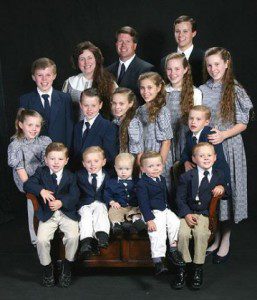
Since converting, I’ve been part of countless conversations about family planning, especially in our early years because we had three kids in as many years. Everyone, including total strangers, wanted to know if we were “done” or if we’d scheduled the “Big V” yet. My standard retort was, “Are you kidding? Have you seen my husband? As if I could control myself being married to someone that hot!”
But a few months after the birth of our third, I developed serious health problems. So we decided to postpone conceiving for a while and began using natural family planning (NFP) again. One day, I lamented to another Catholic mom that it would likely be a few years until we could try for another baby. I will never forget what the woman said to me then: “Misty, if you had a stronger faith, you wouldn’t need NFP.”
I think my head spun around like Linda Blair’s at that point. She must have seen the homicidal glint in my eye, because she immediately began backpedaling, saying how “fortunate” it was that we had access to NFP.
I shouldn’t have been surprised, because the woman and her husband were providentialists, which means they have turned their fertility over to God entirely. That means no birth regulation of any kind, including NFP. The babies come when they come and you choose to accept each one as an unmitigated blessing from God, regardless of your circumstances. Michelle and Jim Bob Duggar are perhaps our nation’s most famous providentalists.
With the majority of Christians having embraced the secular view of sexuality and marriage, it’s refreshing to encounter couples who turn such an important part of their lives over to Providence. Their willingness to accept all blessings God sends their way is admirably generous and provides a powerful witness to the faith.
Unfortunately, there often seems to be a contentious relationship between those who practice NFP and those who subscribe to the providentialist mindset. When a woman says she feels drawn to “let go and let God” when it comes to her fertility, she is often bombarded with exhortations from the NFP crowd about the potential pitfalls of such a course. The generosity of spirit inherent in providentialism can easily be overlooked and go unappreciated.
Conversely, more than one providentialist has been guilty of implying that any couple who uses NFP except in dire situations is doing so with a “contraceptive mentality.” As I discovered, there is the temptation to condescend to couples with fewer children, with the underlying judgment that those who use NFP to space their children are somehow less radically Catholic.
My Way or the Highway
At the heart of this contentious relationship between the natural family planners and the providentialists is the desire for personal validation.
 New parents are often puzzled by their own parents’ reactions to their childrearing practices. If Grandma used formula and her daughter-in-law decides to breastfeed, Grandma may feel implicitly criticized. Seeing the happy breastfeeding pair may bring up feelings of guilt or provoke memories of Grandma’s own failed attempts to nurse. Without even realizing it, Grandma may begin unconsciously trying to sabotage the nursing relationship by making subtle but demoralizing comments to her daughter-in-law or reacting with thinly-veiled disgust when she sees the baby being fed.
New parents are often puzzled by their own parents’ reactions to their childrearing practices. If Grandma used formula and her daughter-in-law decides to breastfeed, Grandma may feel implicitly criticized. Seeing the happy breastfeeding pair may bring up feelings of guilt or provoke memories of Grandma’s own failed attempts to nurse. Without even realizing it, Grandma may begin unconsciously trying to sabotage the nursing relationship by making subtle but demoralizing comments to her daughter-in-law or reacting with thinly-veiled disgust when she sees the baby being fed.
On a conscious level, Grandma has no intention of hurting her daughter-in-law or taking something valuable away from her grandchild. But like all of us, Grandma needs validation. She needs to feel like her childrearing decisions were the best decisions that could have been made. She loved her son and gave him the best she could. So why isn’t that good enough for her daughter-in-law?
Our need for validation most often manifests in an attempt to homogenize the human experience. We want everyone to do what we do, because as long as we’re all doing the same thing then no one runs the risk of making a mistake. Let’s face it: deep down we’re all a little insecure, which is why we so often feel the need to point out the pitfalls of others’ decisions. Family planning is no different—but it should be.

Different Callings
For some things, we are all called to the same standards. God expects us all to love and serve one another, to avoid sins like stealing and lying.
Yet Jesus made it clear that even beyond that, individuals are specially called. “From everyone who has been given much, much will be required; and to whom they entrusted much, of him they will ask all the more.” (Luke 12:48) Instead of judging and disparaging those who don’t follow our family planning path, perhaps it would be more helpful to consider family size a calling within our vocational calling as a married couple. There’s no doubt large families provide a powerful witness to our ailing world, which is why the Holy Spirit calls certain couples to embrace providentialism. If a couple has prayerfully discerned that God is asking them to surrender their fertility entirely to Him, who are any of us to say they should resist that call?
Providentialists, on the other hand, need to recognize that God calls other couples to use NFP. One obvious reason for this is that if all couples are providentialist, who will be left to practice and teach NFP to those rare few couples who, in the minds of the providentialists, legitimately need to space births? Or to call secular couples to a lesser degree of sin by convincing them to use NFP over potentially abortive contraception? I can only imagine the credibility I would have as an NFP teacher if I had never successfully practiced the method myself: “We’ve been married 10 years and have 10 children. We’ve never used the method but I’ve been told that it’s 99% effective at preventing pregnancy.”
It’s interesting that the greatest advances in fertility awareness came about in the last few generations, with the development of the modern nuclear family. Providentialists need to acknowledge that few couples today have access to the kind of family support in generations past that enabled women to endure back-to-back pregnancies and raise many young children at the same time. Few modern mothers have more than a few weeks or even days of postpartum help before they’re expected to resume their household duties. One in four women now gives birth by C-section, resulting in an even more difficult recovery. To insist that every woman should be able to handle as many children as God gives her—even if God “gives” her debilitating pregnancies and surgical births, with no domestic help, as He has me—is not only unrealistic, it is the pinnacle of arrogance. As they say, everything is possible to the man—or woman—who does not have to do it.
There is no “right” size for a faithful Catholic family. Some couples may be called to have a dozen children and some may only be called to only have a few. Other couples may endure the cross of infertility and be called to different sacrifices and generosity. I like to remind people that the holiest family of all only had one child.
If there is a single standard for determining family size, it’s this: “What does love demand?” Sometimes love demands generosity, but sometimes it demands sacrifice. The Church teaches that as long as couples plan their families morally, then it is the right and privilege of each couple to discern God’s will for their family. So let’s not sit in judgment of others, who may have been given graces or crosses that we haven’t. When it comes to family planning, don’t be more Catholic than the Pope!
